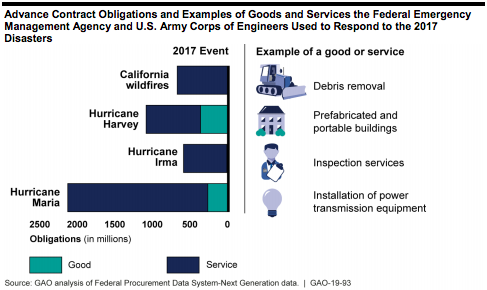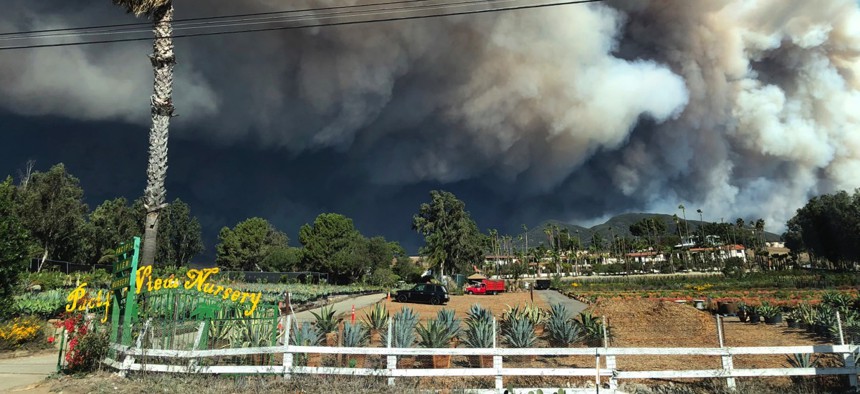Connecting state and local government leaders
A new federal report report on 2017 advance contracts found the agency’s coordination on disaster response remains wanting.
The Federal Emergency Management Agency should improve coordination with states and localities on the use of advance contracts, given leaders’ stated goal of shifting more responsibility to states after disasters, according to a new report on 2017 contracting.
After Hurricane Katrina in 2005, Congress directed FEMA to arrange contracts for goods and services like debris removal, housing, inspections, and electrical installations ahead of disasters to speed up response and reduce costs.
FEMA and the Army Corps of Engineers “relied heavily on advance contracts” while response to hurricanes Harvey, Irma and Maria and the California wildfires, obligating $4.5 billion as of May 31, according to the Government Accountability Office. But GAO found “inconsistencies” in FEMA’s coordination with states and local governments and about the information the agency is required to provide on advance contracts.
“Without consistent information and coordination with FEMA, states and localities may not have the tools needed to establish their own advance contracts for critical goods and services and quickly respond to future disasters,” reads GAO’s report released last week.

In response to what they described as a patchwork of outreach to states and localities, GAO advised FEMA Administrator Brock Long to ensure the head of contracting activity updates the Disaster Contracting Officer Desk guide. The guide instructs FEMA’s regional officers on how to communicate with states and localities about establishing and using advance contracts.
While some regional officers told GAO they regularly perform outreach on security and transportation to learn what resources states and localities have in place and for how long they can provide them after a disaster, those in one unidentified, geographically dispersed region with fewer disasters did not.
Another unidentified regional official reported “minimal” coordination of advance contracts with state and local officials ahead of Hurricane Harvey. In some cases, talking with local officials about these contracts only occurred when they were physically located with federal officials during the disaster.
GAO found some local governments hired the same contractors for debris removal following hurricanes Harvey in Texas and Irma in Florida, resulting in delays completing the work that could have been avoided with better communication. During the California wildfires, state and local officials reported different expectations about which razed buildings the Corps would remove and acceptable soil contamination levels.
One recommendation in the report advises Long to have the head of contracting activity identify a centralized resource listing and regularly update available advanced contracts that states and localities are made aware of.
GAO found FEMA’s current listing scattered and incomplete—26 advance contracts in May training documentation were missing from the agency’s June listing. Those contracts were for goods and services like foreign language interpretation, hygiene items and short-shelf meals.
FEMA already identified areas for improvement in its after-action report about the 2017 storms—promising a state and local toolkit to reduce their reliance on FEMA assistance post-disaster. But the contents of the toolkit, including FEMA’s advance contract list, remained undecided as of August, according to GAO.
In FEMA’s own report, the agency acknowledged shortcomings after Hurricane Maria hit Puerto Rico, including both staffing shortages and failures to have adequate supplies available ahead of the storm to help people on the island.
FEMA officials told GAO adding the listing to the toolkit was “overly prescriptive” because different states experience different disasters and regional officers are responsible for sharing that information anyway.
In a letter response to the recommendations, FEMA concurred and said it would keep GAO updated on any fixes it makes to its process and listing.
“Given FEMA’s recent emphasis on the importance of states and localities having the capability to provide their own life-saving goods and services in the immediate aftermath of a disaster, clearly communicating consistent and up to date information on the availability and limitations of federal advance contracts through the toolkit, or other means, is critical to informing state and local disaster response efforts,” reads GAO’s report.
Dave Nyczepir is a News Editor at Government Executive’s Route Fifty and is based in Washington, D.C.

NEXT STORY: Ending Weed Prohibition Hasn’t Stopped Drug Crimes




